Have a question? Ask the expert!

What Is Arbor Day?
One of my earliest memories of Arbor Day was when I was in elementary school. We would all leave our classrooms and gather outside around a tree that was about to be planted. There we would find a hole that a couple of the custodians from the school had already dug and we would slide the tree into the ground. The principle would say a few quickly forgotten words and we would all traipse back inside to finish our studies for the day. For the teachers

Be On the Lookout: Large Patch Symptoms Now Showing!
This disease was formerly called Brown Patch , which is a disease that affects cool-season grasses in the middle of the summer. It is basically the same disease, but Large Patch begins the infection process in the fall and the symptoms show in the late spring early summer. Brown Patch begins to infect cool-season grasses during periods of high heat and humidity and the symptoms immediately show on the lawn. </
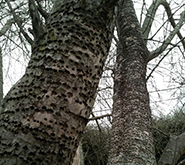
Sapsuckers: Don't Let Them Destroy Your Trees!
I have written about birds called Sapsuckers, primarily Yellow-Bellied Sapsuckers . I have received several questions this year regarding the damage that these members of the wood pecker family inflicts upon trees (There are over 250 species of trees that they will feed on during the year) and what c

Watch Out For Large Underwing Moth Larva
Last fall, we described a new turfgrass pest that was causing some damage in the Seattle area. At the time the article was written, the insect was thought to be an army cutworm. Since that time, we have learned that it is the larva of the Large Underwing Moth . </

Buying a Tree Isn’t an Impulse Purchase
If you drive by a nursery or garden center, you will see all types of trees and shrubs up for sale during this time of year. Although fall is the best time of year to plant a tree, all the new trees are on display. If you are in the market for a new tree to plant at your home or at the home of a friend, neighbor or relative, do a little research before you go shopping. 3 things to consider when doing your research: What kind of tree do you want to purchase?
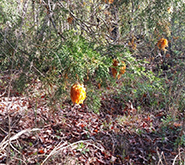
What Are Those Orange Slimy Growths In My Trees?
We recently received this picture from Franchise Owner John David Andrus in Opelika, AL . He came across these bright orange, gelatinous-looking growths hanging from an arbor vitae on his property. He knew that what he was seeing was the gall from a disease known as Cedar-Apple Rust, but he never had seen the galls up close and personal. Cedar-Apple Rust is an interesting disease as it requires two differe
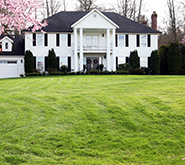
Should You Be Seeding Your Lawn This Spring?
Occasionally a customer will ask if they can seed their lawn in the spring. For those who live in the south, the grasses that grow in your area are usually not started from seed. Therefore this article is mainly directed at areas where cool-season grasses grow. In most cases, seeding your lawn in the spring is not a good idea. The main reason for this is that weed control cannot be applied before or after the lawn is seeded. This is true for the pre-emergent weed control products that are designed to inhibit
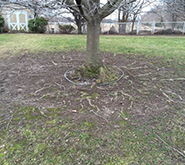
What You Should Do About Exposed Tree Roots
One of our Franchise Owners received some pictures of an all too common problem in many home landscapes – exposed roots under a tree. The customer wanted to know what could be done in order to grow grass or even cover the roots so that it is easier to mow in that area. As you can see from the picture, there is almost no grass growing under the canopy of the tree and there are a number of exposed roots. For this particular situation, my suggestion would be to forget about growing grass under this tree. It obviously is too shady
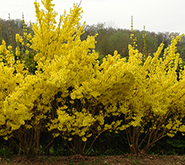
The Forsythia Are Blooming! What Does That Mean For You?
There are a number of old sayings when it comes to gardening, such as “ the corn should be knee high by the 4 th of July ” or “ you have to add lime to sweeten the soil ”. However there are not too many old sayings when it comes to lawn care, but one that often gets thrown around at this time of year is “ apply your crabgrass preventer when the forsythia bloom. ” As we often find out, these old sayings are not usually based on scientific evidence and, for the most part, cau
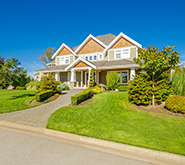
The Weed That Can Grow Just About Anywhere.
If you live in the northern part of the US, this is the time of year when your grasses begin to turn green, spring bulbs begin to pop-up, early spring flowers are blooming and everyone is anxious for the warmer weather to return in earnest. You look across your lawn and are dismayed when you see large patches of brown grass in your otherwise green lawn. What’s going on? If your lawn looks somewhat like the lawn in the picture below, then you have a grassy weed known as Nimblewill. This grassy weed is native to areas where warm-
